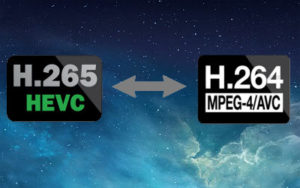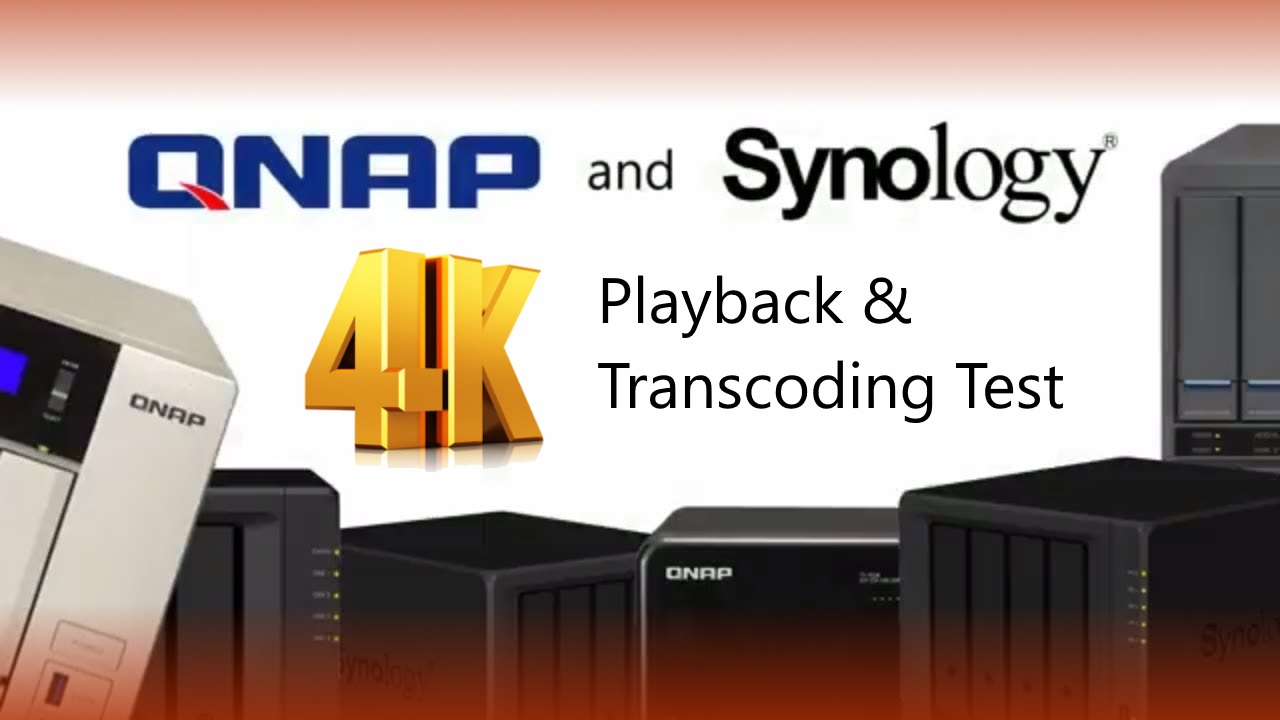Transcoding 4K Media on the QNAP TS-877 NAS Plex Media Server?

Transcoding on a NAS such as the QNAP TS-877 device is the ability for a multimedia file to be changed from it’s existing format or codec to one that is better suited to the destination device. In this file access, the QNAP TS-877 NAS is the host device and the device you want to play the file is the client. This is the case of whether you are using Plex or not. Transcoding is typically required when a media file is more recently released than the client device that is accessing it, so the newer compression or playback format is unknown to the device you want to access it with. Alternatively, you want to access the movie or music on your QNAP TS-877 and do not want to use the original file in its full size. Transcoding can enable you to stream a much smaller version in weight or resolution if needed. IN a popular program such as PLEX, smooth playback is essential, and with the plex media server application on the QNAP TS-877 NAS using a larger percentage of CPU and Memory than most programs, it is very useful to know the plex transcoding abilities of any NAS.
Why should you factor transcoding with a Plex Media Server on a QNAP TS-877 NAS

When you install a Plex Media Server on your QNAP TS-877, you should know that plex is not the answer to all of your media prayers. It has some limitations and depending on the NAS you use, these limits can be annoying. You will most likely have media files in a large collection of different formats and there is no guaranteeing that these are going to be compatible with TVs, iPads and Smartphones that you wish to watch them on. Although you will have a version of the Plex app on the viewing device, that app will still be locked to playback the supported media types on that device.
So if your phone does not support.MKV or .MOV, then neither does the plex app you installed on it. However, this is where transcoding comes in again, as the plex media server will use the NAS system resources to change the file to a version/format that it CAN play. What makes transcoding with Plex different to ordinary transcoding is that often, the NAS (in this case, the QNAP TS-877) will not let the plex use the transcoding engine inside. This is not the end of the world, as it will use raw system power instead. The result is that where a regular transcode outside of plex will use 20-30%, in plex it could go as high as 70-80%. This is why it is important to know how well a plex NAS will transcode, as if it will hapen regularly, it could potentially slow down the general use of your QNAP TS-877 NAS.
Which plex supported client devices require transcoding from the QNAP TS-877 NAS
Destination devices range greatly and are often referred to as the client device. Common client devices that your QNAP TS-877 device will be accessed by are often:

- iPad or Android Tablet
- iPhone or Android Smartphone
- Smart TV or DLNA supported monitor
- Macbook, Laptop or Netbook device
- Sound systems such as Bose, Sonos and Sony DLNA systems
- Home Theatre Systems
- Network and internet-enabled gaming consoles such as PS4, Xbox One and Nvidia Shield
Transcoding between a QNAP TS-877 and your media can be of tremendous benefit for those with limited internet bandwidth, download limits or low powered devices whilst using the plex client application.
What are the Specifications of the QNAP TS-877 NAS?
The specifications for the QNAP TS-877 NAS are below and like all NAS devices, the CPU and Memory play a big part in how well it performs at transcoding both in and out of plex. The key factors to consider are if the device features an x86 or ARM-based CPU, does the QNAP TS-877 CPU feature a transcoding engine and how much RAM the device arrives with for multiple transcoding tasks. Below are the QNAP TS-877 specs:
What is the difference between H.264 and H.265 4K Media on a NAS

H.264 and H.265 are common codecs of modern digital media. H264 is also referred to as AVC by experts (Advanced Video Coding) and is considered the standard for video file compression. This allows for media originally created for large-scale entertainment to be recording, compressed, and distributed to the home and smaller scale production of digital video content watched by you, the consumer via plex.
H265 is the newer and more consumer-friendly alternative to H264. It is also known as HEVC (High-Efficiency Video Coding) and was developed in order resolve issues of enormous 4K media files being just too large for your client device to playback. H.265 has become so popular and data saving that chances are that the YouTube clip, iTunes media or iPlayer content you watched was in .265 and HEVC. Typically a modern NAS such as the QNAP TS-877 will playback with JUST H.265 or it will PLayback both H.264 and H.265. The latter pretty much being exclusive to x86 or AMD based NAS CPU devices.
The QNAP TS-877 NAS 4K H.265 8-bit 30fps 46Mb/s PLEX Test 1- How well does it perform?
We pushed the QNAP TS-877 NAS to transcode a 4K H265 media file through the plex media server application. It was an 8-bit recording, running at 30 frames per second and featured a bitrate of 46 megabits per second. The QNAP TS-877 playback results were:
The QNAP TS-877 NAS 4K H.265 8-bit 25fps 38Mb/s PLEX Test 2 – How well does it perform?
Next, we pushed the QNAP TS-877 NAS to transcode a 4K H265 media file through the plex media server application. It was an 8-bit recording, but this time running at 25 frames per second and featured a bitrate of just 38 megabits per second. The QNAP TS-877 playback results were:
The QNAP TS-877 NAS 4K H.264 8-bit 30fps 51Mb/s PLEX Test 3 – How well does it perform?
Next, we pushed the QNAP TS-877 NAS to transcode a 4K H264 this time, the media file was an 8-bit recording, but this time back at 30 frames per second and featured a bitrate of 51 megabits per second, our highest yet. The QNAP TS-877 playback through the plex media server application results were:
The QNAP TS-877 NAS 4K H.264 8-bit 2Mb bitrate 30fps 18Mb/s PLEX Test 4 – How well does it perform?
Next, we pushed the QNAP TS-877 NAS to transcode another 4K H264. The media file was also another 8-bit recording and 30 frames per second but this time with a much lower bitrate of just 18 megabits per second, our lowest yet. The QNAP TS-877 playback results through the plex media server application were:
The QNAP TS-877 NAS 4K H.264 8-bit UHD 30fps 42Mb/s PLEX Test 5 – How well does it perform?
Just to make sure, we ran an almost identical test again with another 4K H264 media file through the plex media server application at 8-bit weight and back at 30 frames per second and 18Mb/s bitrate on the QNAP TS-877 NAS. This time the results were:
The QNAP TS-877 NAS 4K H.265 10-bit 25fps 19Mb/s PLEX Test 6 – How well does it perform?
Now we started transcoding with the newer and more efficient H.265 4K format on the QNAP TS-877 through the plex media server application. Using a similar file, but encoded in H265, the media file was a 10-bit recording, 25 frames per second but this time with a much lower bitrate of just 19 megabits per second. The QNAP TS-877 playback results were:
The QNAP TS-877 NAS 4K H.265 10-bit 30fps 38Mb/s PLEX Test 7 – How well does it perform?
We then ran a much denser H.265 4K file on the QNAP TS-877. This H265 file through the plex media server application was another 10-bit recording, at 30fps but this time with a much higher bitrate of 38 megabits per second. The QNAP TS-877 playback results were:
The QNAP TS-877 NAS 4K H.265 10-bit 42fps 38Mb/s PLEX Test 8 – How well does it perform?
Test number 8 was an almost identical file to that of test 7, but this H.265 4K file on the QNAP TS-877 through the plex media server application featured much higher frames per second count of 42fps. To confirm, this test was a 10-bit, 42fps h265 file at 42 frames per second. The QNAP TS-877 playback results were:
The QNAP TS-877 NAS 4K H.265 10-bit 50fps 23Mb/s PLEX Test 9 – How well does it perform?
Moving it higher and higher, test 9 featured an even more punishing H.265 4K file on the QNAP TS-877. It featured the highest frames per second count yet at 50fps. To confirm, this test was a 10-bit, 50fps h265 file at 42 frames per second. The QNAP TS-877 playback results through the plex media server application were:
The QNAP TS-877 NAS 720p H.265 8-bit 24fps 1Mb PLEX Test 11 – How well does it perform?
In an effort to fully test the spectrum of the QNAP TS-877 NAS and it’s transcoding, we wanted to also test HD Playback (to give the 4K results a sense of perspective). First up was 720p. This 720 HD file through the plex media server application was another efficient H.265 8-bit file. It ran at 24fps and was just 1Mb in bitrate. The QNAP TS-877 NAS performed as expected (given the earlier results):
The QNAP TS-877 NAS 4K H.265 10-bit 30fps 400Mb/s PLEX Test 14 – How well does it perform?
After the rather cursory tests of the HD files, we decided to really fire a big 4K file at the QNAP TS-877 NAS for transcoding through the plex media server application. This time we went in heavy with a less efficient H.265 (HEVC for those that forgot) 10-bit file, running at 30fps. The real killer was the 400Mb/s bitrate. How well did the QNAP TS-877 NAS server cope with this 4k transcoding? Here are the results:
The QNAP TS-877 NAS Ultra HD 4K H.264 8-bit 24fps 22Mb/s PLEX Test 15 – How well does it perform?
We then decided to end on an older and currently more common owned 4K type of media file. This was kind of our control tests for most NAS and was no exception for the QNAP TS-877 through the plex media server application. This UHD file in 4K was an 8-Bit file, arriving in 24 frames per second and at a bitrate of 22megabits per second. For those who have owned 4k media for a while and want to consider their older H264 material, this test would be of interest. The results were.
I hope these Plex Media Server 4K results were of use to you and this helps you consider which NAS you wish to you buy in 2018, whether it is the QNAP TS-877 or something more or less suited to your needs.
📧 SUBSCRIBE TO OUR NEWSLETTER 🔔🔒 Join Inner Circle
Get an alert every time something gets added to this specific article!
This description contains links to Amazon. These links will take you to some of the products mentioned in today's content. As an Amazon Associate, I earn from qualifying purchases. Visit the NASCompares Deal Finder to find the best place to buy this device in your region, based on Service, Support and Reputation - Just Search for your NAS Drive in the Box Below
Need Advice on Data Storage from an Expert?
Finally, for free advice about your setup, just leave a message in the comments below here at NASCompares.com and we will get back to you. Need Help?
Where possible (and where appropriate) please provide as much information about your requirements, as then I can arrange the best answer and solution to your needs. Do not worry about your e-mail address being required, it will NOT be used in a mailing list and will NOT be used in any way other than to respond to your enquiry.
Need Help?
Where possible (and where appropriate) please provide as much information about your requirements, as then I can arrange the best answer and solution to your needs. Do not worry about your e-mail address being required, it will NOT be used in a mailing list and will NOT be used in any way other than to respond to your enquiry.

|
 |
Best NAS for under $499
Best NAS for Under $250 (2025)
Minisforum N5 Pro NAS - FIRST IMPRESSIONS
HexOS Q2 Update - What's Changed?
5 Exciting NAS Coming Later in 2025
Beelink ME Mini vs GMKtec G9 vs CWWK P6 NAS Comparison
Access content via Patreon or KO-FI



















DISCUSS with others your opinion about this subject.
ASK questions to NAS community
SHARE more details what you have found on this subject
CONTRIBUTE with your own article or review. Click HERE
IMPROVE this niche ecosystem, let us know what to change/fix on this site
EARN KO-FI Share your knowledge with others and get paid for it! Click HERE